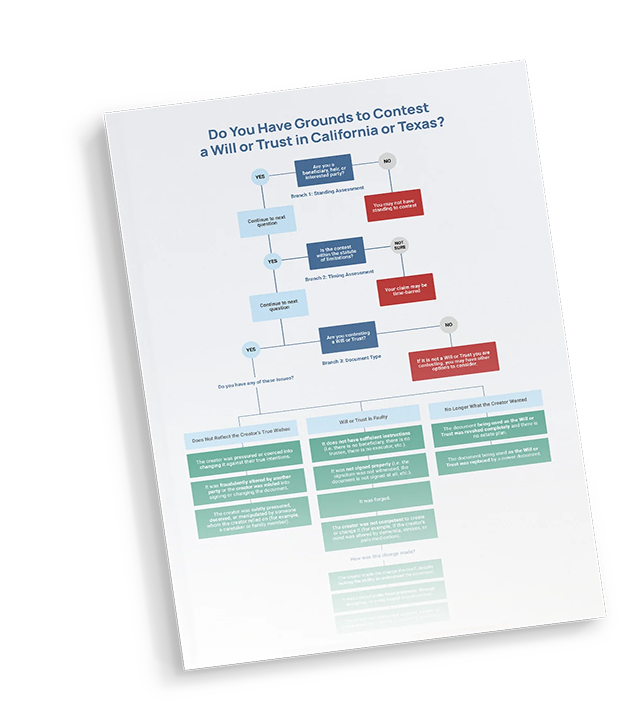How common is contesting a trust?
The short answer is that it’s more common than you might think. In fact, we pursue trust contests and help protect clients from family members contesting trusts every day. Each year in the United States, thousands of trusts and wills are disputed in probate court. While the vast majority of wills and trusts go undisputed, there’s nothing wrong with contesting a will or trust. If you think a will or trust is written unfairly, was the product of undue influence, fraud or incapacity, or the executor or trustee is not administering the will or trust correctly, it’s time to call counsel.
Ready to Get Started?
Our probate attorneys focus on all types of trust and estate disputes. Whether you’re a trustee, executor, heir, or beneficiary we can help you resolve your probate dispute.
Will my family be mad if I contest a trust?
In our experience, emotional issues and concerns usually pre-date the loss of a loved one and the decision to contest a trust. Those emotional issues, and the divisions they can create in families, can sometimes be exacerbated by the filing of trust contest. However, often times a contest also will align certain family members and bring them closer. A meaningful discussion of these issues should be part of the discussion you have with a trust litigation attorney before initiating a trust contest.
Will my family support me if I contest a trust?
It depends, but in most families there is some division between the contesting and non-contesting parties. Usually the division arises not because of the money involved, but rather because the non-contesting party does not understand why the contesting party is upset and taking action. Whatever the case, each side needs to embrace the process with empathy. It’s the only way keep litigation, and litigation costs, from spiraling out of control, driven not by common sense but instead by emotion.
What should I expect to happen if I contest a trust?
You should expect to have a detailed handle on the reasons why your contesting, including facts and evidence to substantiate your claims. The more specific, the better. You should have witnesses who will corroborate your claims. Again, the more, the better. You should expect to spend time with your trust litigation attorney helping them understand all of the circumstances surrounding your contest claims so that they can be asserted clearly and concisely. You should expect to have your trust litigation help walk you through each phase of the litigation process, including discovery and depositions (information exchanges), mediation (formal settlement proceeding with a sitting or retired probate judge), and trial. You should expect your trust litigation attorney to handle the court hearings, which you should not need to attend.
When do I need a trust contest attorney?
The moment you suspect that a trust does not accurately reflect what your loved intended, whether it’s the type of gift, the amount of a gift, gifts to others, who serves as trustee, or any other trust provision, it’s time to contact a trust litigation attorney. Many trust lawyers will offer a free consultation, and many but fewer will take trust contest cases on contingency, eliminating your risk of having to pay your attorney fees if the case cannot be won.
Involved in a trust dispute?
RMO offers professional legal representation to protect your interests.
Serving clients across California and Texas
How long will it take to contest a trust?
While many trust contests take 12-36 months to get through the probate litigation process, we pride ourselves on being efficient and cost-effective. What does that mean? The vast majority of our cases are resolved sooner (in under 12 months) and for less cost (lower attorney’s fees and costs). Of course not every case can be resolved as swiftly, but identifying key strategies early and executing on those strategies gives you the best chance of securing your best result sooner.
Do I need a trust lawyer near me?
We recommend finding an experienced trust attorney familiar with the county probate court in the county where the trust is located. For example, if the beneficiary lives in San Diego, yet the trust is in Los Angeles, we recommend working with a trust lawyer in Los Angeles. A Los Angeles trust lawyer will generally be more familiar with the Los Angeles Superior Court Probate Division, versus an out of state attorney.


